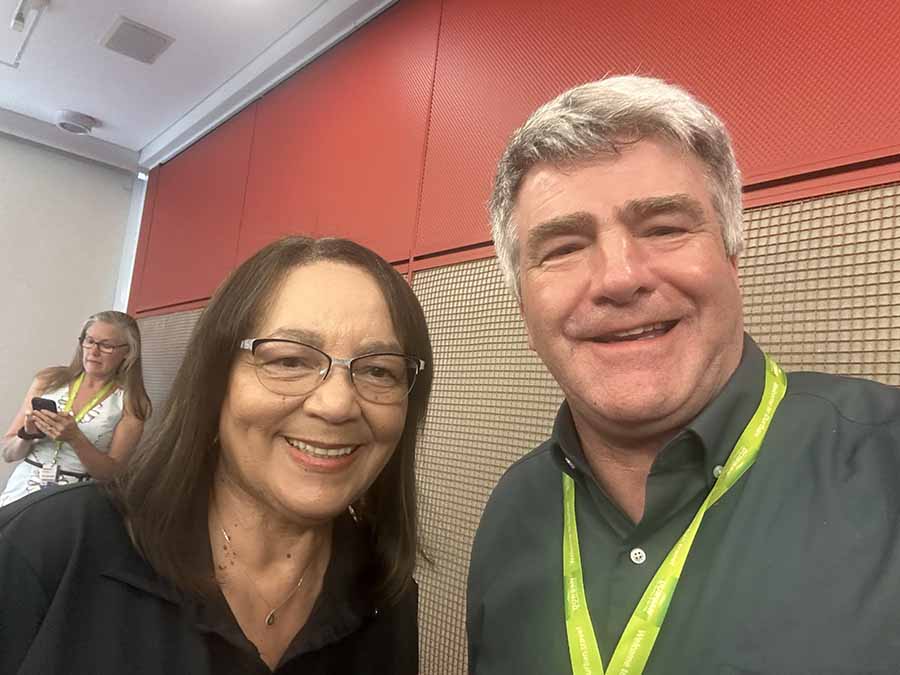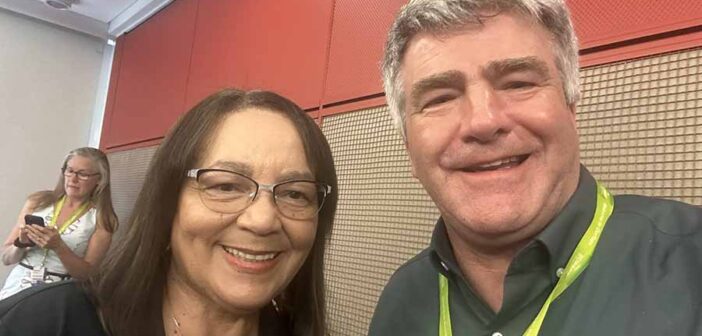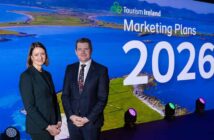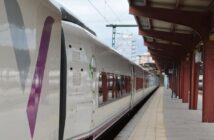
Britain and Ireland are great markets for us. You can’t even put a value to it because it’s very, very, very important. It’s the second biggest overseas market after America. That is how important Britain and Ireland are to us. It’s our second biggest overseas market after America. We’ve seen almost an 82pc increase in Britain and Ireland since COVID-19 in 2019. It’s a very important market for us.
Out of the international arrivals that we’ve seen, for instance, in the first quarter of this year from January to March, we have also seen a big growth. Ireland is back to 5pc above pre pandemic levels.
In Britain there was some alert put out about South Africa and the safety and all of that. What we have seen from both Britain and Ireland is only growth. But in any case, that was dealt with at another level at our international relations department.
Improving air access (and flights to Ireland)
Improving air access is a priority for us. We want to make it possible for more people to visit South Africa. Direct routes are also essential for us to grow tourism in our country. I know even with myself when I’m flying, I like to fly directly to my destination without having to go via another country.
On air access, I have engaged with all the 26 African ministers that are here and deputy ministers on air access into Africa.
You know, sometimes you have to travel out of Africa and then come back. Hopefully, we also discussed it last year. Hopefully, we can find a way whereby African governments can realise the value of air access and improving air access, especially on the continent. We spoke yesterday about what are some of the issues that are holding back some African countries. It’s just regulations, the high taxes to enter, there are a number of things that African governments must look at so that we can incentivise other airlines to fly to our country.
From England, British Airways and Virgin Atlantic both offer daily flights to Johannesburg and Cape Town.
Additionally, North Atlantic Airways is going to launch a new direct route from London Gatwick to Cape Town starting on the 28th of October 2024. As you can see, we are slowly improving. Britain and Ireland are great markets for us. There are a number of indirect flights which include Ethiopian Airlines, Kenyan Airlines, Qatar Airways, and Swiss Airlines. However, they are indirect, coming from their countries via Europe into South Africa.
South African Airways
With our own airline, South African Airways, we have taken a very cautious approach to opening up to international markets. We are looking forward to having the direct flight back with SAA between Cape Town and to London.
They have made great strides but have not fully recovered after COVID. During COVID, they went into business rescue and at the time, the government also did not have the money to rescue them because in the past, they have received a number of bailouts from the government.
A private sector company came in during COVID and made an arrangement with the government to take over the operations of SAA, on the condition that 51pc ownership for this private company and 49pc to the government. At that time, it worked. They were able to bring back a number of flights into the region. They have been able to bring back a flight between Brazil, Sao Paulo, and Cape Town and Johannesburg.
Just last week, they launched a flight and it was fully booked. They were slowly coming back. Unfortunately, a couple of months ago, something happened, I still don’t know what the reason was, but this 51pc ownership versus 49pc deal came unstuck and currently, SAA is looking for a new partner.
They are looking for equity, and there is quite a lot of interest, so we hope that within the next couple of months, we will be able to see South African Airways become more settled because it is now in transition from the other private company to looking for a new equity partner. In terms of incentives for airlines to fly here, yes, we are working with the airports company, the Department of Transport, and the Cabinet.
My Cabinet President has asked the Department of Tourism to create a national air access proposal because currently, you have four different provinces doing their own air access: Cape Town, Durban, Eastern Cape, and Gauteng.
The intention and proposal that I will be putting before the Cabinet is that we need to establish a special purpose vehicle that consists of the private sector and the public sector. I personally don’t believe that the government should run airlines.
The government can own an airline, but they certainly should not run it, and therefore, we want the private sector involved right from the beginning.
Nomad tourism, work from South Africa
There are also the seasonal markets when it’s cold in Europe, it’s warm here with us, and we find, especially from the German tourist market, we know in February all spaces are booked out from people coming from Europe or Norway or Sweden. And so there’s also value there.
We have just come out with new regulations around Nomad tourism, Nomad visas. The regulations were published and it was in the public domain for about three days, and then the minister withdrew it again. But it’s going to come out soon, whereby basically people can work from anywhere in the world. I spoke to him to find out why did you withdraw the regulations because people are waiting on this, you know. But he said the one thing in the regulations that we did not accommodate was that in terms of the tax regime for people working from South Africa. South Africa has tax agreements with many countries – bilateral agreements. So you can’t have a tax regime that covers the whole world. South Africa has to consider the existing bilateral agreements when it comes to tax.
And so a person will be able to come and work from South Africa for a period of 6 months. I think the first proposal was that you will not be charged any tax for 6 months, and then thereafter you need to start paying tax. And the minister informed me just last week that he will certainly be republishing the tax regimes on Nomads… what is the other word, they call them swallows, swallows, yes, that’s the word. So that is going to be the next offering from South Africa where we now finally have regulations and laws that will regulate people who want to live in South Africa, enjoy our summer, and work from anywhere in the world.
Tourism is 6.7pc of GDP
In South Africa, they measure the contribution of tourism to the GDP every second year, so we’ve got no statistics for 2023, but we have got preliminary statistics from the WTTC, the World Travel and Trade Council. I mentioned that in my speech this morning; those are the only figures that we have. But last year, tourism contributed about 6.7pc to GDP; it created 1.3m jobs.
The tourism master plan that we have adopted in September is a framework. It’s like a pathway to build up tourism. And we had another plan, the Reconstruction and Development of Tourism after COVID, like a recovery plan. So we took that recovery plan and we put it into a master plan. For the first time, the master plan consists of inputs from both the private sector and the public sector.
When you talk about the nine provinces that we have in South Africa, now we don’t have a federal system, we have a unitary system but sort of a hybrid whereby there are certain functions that are concurrent powers between the national government and the provincial governments, and tourism is one of those. So there’s a lack of coordination, and people have become very territorial. Like the Western Cape is just doing things for themselves, KZN on their own, Gauteng on their own, and they’re actually competing with one another, and there’s no problem with competition, that’s what I spoke about this morning, but you have to collaborate because it’s one country.
So there’s a lot of… it’s not very inclusive because they’re not working together, and that is why we want to have one National Air Access Strategy. We want to promote the whole country with all of those options. Once we’ve put that together, like Durban now, we get more direct flights to Cape Town. Cape Town has gone to Brazil, for instance, and said fly directly to Cape Town, and now the other provinces are beginning to do the same – to the same airline, also fly to Durban. Is that year-round or just seasonal, the Brazil one? No, it’s year-round. That is South African Airways. One of the flights that came back last year, December, November, yeah, the first flight was on the 1st of December.
So you’re dealing with politicians who want to showcase their own and urban areas who want to show that they’re doing better than your province. Competition is good, but we need to collaborate more.
Removing unsafe routes from Google maps
I recently approached Google because what we are lacking behind in the South African tourism space is that we are not making enough use of digital and technology, and I’m afraid the world is going to pass us by. So we approached Google to help us with that. But Google, including in the agreement, also has some training for small businesses or any other business that would like training on the Google Maps. Google also works with us on safety issues. We sat down with them and then show them on the Google Maps which are dangerous routes, like you find routes in all countries that sometimes it’s not very safe. We had one example in the City of Cape Town where Google actually removed that route because it was like a shortcut route through the area where the tourist was killed.
So we work with them on safety issues. We’re also working with them, and they have invested almost $5m in us. I would like to set up a live barometer to measure the number of jobs created by the tourism sector – like real-time, you know, you can see because I would like to set up a live barometer to measure the number of jobs created by the tourism sector in real time, you know, so you can see. Because people just say for every tourist that arrives in our country, it creates jobs. So I’m asking, where are these jobs? Which part of the value chain? So we’re working with Google on that now to assist us. But it is more to assist us to overlay our tourism vision, our master plan overlay that with technology and with digital and show us what the latest developments are in the world. But we can certainly give you a copy of that.
Why we’re working with Airbnb is that since the growth of Airbnb, we must guard against government trying to regulate the idea of Airbnb. And I’m saying to the government, you can regulate the spaces where Airbnb is going to be used, but not the idea. Because sometimes government wants to go too far and so on. And so we’re working together with them on policy spaces, you know, their rental market. Of course, the local municipalities would like them to pay rates and taxes. And now we’ve been able to get an agreement with Airbnb on a policy level that we’ve included in our master plan. So we didn’t have to go through this whole process trying to come up with an Act of Parliament. That’s how we’re working with Airbnb. And I’m meeting with them tomorrow.
Midrange accommodation lacking in Cape Town
There are many international hotel groups based in South Africa. They all have hotels inside Africa, and in the hospitality industry, you also have a number of small boutique hotels, privately owned hotels. The Red Carnation Group owns specific, exclusive kind of hotels. They own properties like the 12 Apostles in Cape Town, they own the Oyster Box, and the Oyster inanga Rock.
Then, in the Western Cape, where they’ve got a resort and spa, they also decide where they want to build in terms of our MICE strategy where we are lacking overall accommodation. I would like to see the conferences, the meetings, and events being spread across the country.
We’ve got a National Convention Bureau that goes out and bids for these international events, but then you find in smaller and medium towns and cities, there’s not enough accommodation.
So, whether the private sector is looking on their own where they need to build hotels because the government is not building hotels. We certainly have engaged them in the hospitality sector to say, “You must also go outside the bigger cities and build accommodation there. Then we can take smaller conferences, like 200 people, to those cities. But it’s not driven by the government; it’s driven by the private sector.
I know, for instance, also where we’ve got convention centres like the one here in Durban, the one in Cape Town, the one in Port Elizabeth, there is a need for middle-income accommodation, and that’s maybe what’s lacking in Cape Town. There is one hotel now called the Sun Hotel just opposite the convention centre where they really converted an old office block into a hotel. So there are a lot of plans, and now that we are beginning to see the numbers growing, I’m sure the hospitality sector will take that initiative.
Value of the Rand against the Euro
South Africa can be unlimited. I think we are already because as we see with the growth and like I said earlier, you know, the whole package of value for money.
What sets South Africa apart from other destinations? Many things, but I think for me the first one is the value of the Rand against the Euro and the pound. The exchange rate, the Euro, and the pound. When you come here, you’re really getting value for money. The British tourist are able to afford our five-star hotels. So, in terms of value for money, that certainly is a great attraction.
The City of Cape Town and of course also South Africa, we have received numerous international awards. Just recently, Cape Town was placed second out of 40 destinations for value for money. And of course, you know about the UK Telegraph naming South Africa the best country to visit and Cape Town the best city to visit. Additionally, the high level of service received across the value chain of tourism. We are blessed with sun and lovely beaches. What we are doing now is that we are beginning to diversify our tourism offering.
What has been left out in our previous marketing strategy is an important sector within the tourism industry, and that is our primary small towns, villages, and townships. We have now brought them in to become part of that diversification.
We call them hidden gems. That’s why you must go and visit the Hidden Gems Village that is here on the floor at Indaba. The 120 small medium enterprises that you will see there all come from the small villages, townships, and the Department of Tourism, my department, paid for them to be here – we paid for accommodation, we paid for travel, we bought the space on the floor.
There are around 120 of them there, and you will see they are the real hidden gems. I mean, I discover them all the time as I travel around our country. So, we are putting that into the offering. No longer just fares and Table Mountain, there is a lot more to see.
But where we also need help from your side is that I think what is set is travellers coming to Cape Town, going on safari and then going home or going on safari and then going to Cape Town and going home. We are trying to show with our hidden gems the many value-for-money hidden gems that you can find in our country.
Even in Cape Town, you know, you drive 50 kilometres outside of Cape Town, you get to a small French town called Franschhoek with lots of offerings there. You can drive from Cape Town into the Garden Route or take a 40-minute flight to get there. So, we are trying to broaden the scope of what we want to show you that’s available in South Africa. We’ve signed an agreement with Google and with Airbnb, and they will be assisting us to put these small hidden gems on the world Google Map. We have identified them. There’s a website that was just established about 4 months ago where we’ve asked all of those small towns, townships, and villages to register, and there are already over 60,000. So, that is the new offering that we are bringing in.
If you’re going to Cape Town, don’t just go to the beach, the Waterfront, and Table Mountain. Drive 30 minutes into Franschhoek, and you’ll feel like you are in France because it’s got that French base and it will give you French country energy. So, put it on your to-do list, look for little towns like Franschhoek, and I’m sure you know Stellenbosch and there are many others like the Garden Route with an elephant Park but lots more, and it’s just a quick drive – 30 minutes, sometimes longer. But we are trying to encourage people to venture outside of just the normal attractions and they are.
Hidden treasure: the Riemvasmaak
The Northern Cape province is very desert and very rich in minerals. They mine diamonds, copper, magnesium, so you’ve got all of these mining towns. Also, it’s the only small town with an air capacity for the A380 to land. A380s can only land in Johannesburg; now Cape Town is still building their runway, but you’ve got a runway in a town called Upington that can land A380s. Just around 40 kilometres away, very desert, very dry, very hot. We’ve got hot springs where water comes out of the rocks.
There are a few chalets there, not very updated, because you really want to connect with nature. You can get into the water and sit there, and there are small pools where they catch the water, but you can even drink that water. So, there are these hot springs, and what I’m trying to do is to get the private sector to build more chalets there so that we can get more tourists there.
There’s an awesome landscape spot in the Northern Cape, it’s called the Riemvasmaak, where there’s an awesome natural phenomenon where when you stand at that natural hot water spring, you see two mountain ranges with a gap in the middle.
The gap is exactly the shape of Africa, so it’s like the most wonderful natural phenomenon. Two pieces of mountain make it the Instagram-worthy frame. You stand in the middle, and the sky is literally the map of Africa.




